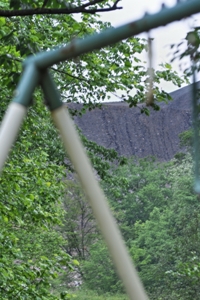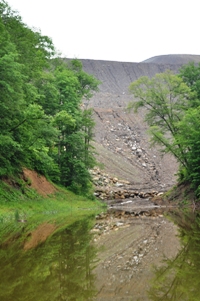Front Porch Blog

Viewed through a swing set on a nearby resident’s yard, this is one of Frasure Creek Mining’s many valley fills at their numerous Mountain Top Removal coal mines.
Last week, Appalachian Voices and our partner organizations won a major victory in the Kentucky courts when a judge overturned two slap-on-the-wrist settlements that the Kentucky Energy and Environment Cabinet had reached with Frasure Creek Mining a few years ago.
These cases began in 2010, when we uncovered blatantly false water monitoring reports that Frasure Creek was submitting to state regulators. The judge’s decision comes just one week after Appalachian Voices and our partners filed a 60-day Notice of Intent to Sue Frasure Creek for returning to their practice of submitting hundreds of false water monitoring reports called Discharge Monitoring Reports or DMRs.
Appalachian Voices is joined in these efforts by Kentuckians For The Commonwealth, Kentucky Riverkeeper and Waterkeeper Alliance, jointly represented by Mary Cromer of Appalachian Citizens’ Law Center, Lauren Waterworth and the Pace University Environmental Litigation Clinic.
Franklin County Circuit Judge Phillip Shepherd’s opinion is scathing and in many places simply speaks for itself:
The Cabinet took the position that it did not have sufficient evidence to support a claim of intentional submissions of knowingly false data, or fraud, by the Defendant or its contract lab…. The Cabinet took this position notwithstanding… that the signatures of the DMRs were often dated prior to the sampling that was being reported, and that multiple DMRs appear to be simply photocopies of prior reports without any evidence that actual sampling took place. The conditions observed by the Cabinet’s inspectors during the performance audit of Frasure Creeks’ so-called “laboratory” demonstrated either a plan or scheme to submit fraudulent information in the DMRs or incompetence so staggering as to defy belief. [Emphasis added]
The opinion goes on to make several other very important points:
The Cabinet chose to limit its investigation to reporting errors…, and not to investigate substantive pollution violations though there were indications of such violations
The integrity of the regulatory process is based on the accurate reporting of monitoring data. If the Cabinet suspects pollution violations but only investigates and assesses penalties for administrative reporting violations, the Cabinet creates incentives for inaccurate reporting or failing to report as opposed to honest reporting that reveals pollution violations.
The Court finds that the economic benefit realized by Frasure Creek in using a substandard laboratory with systematic problems in its DMRs, far exceeds the civil penalty agreed to by the Cabinet.
When one company so systematically subverts the requirements of law, it not only jeopardizes environmental protection on the affected permits, it creates a regulatory climate in which the Cabinet sends the message that cheating pays. [Emphasis added]
[T]he record in this case makes it abundantly clear that the Cabinet simply lacks the personnel and budget to effectively investigate and enforce these requirements of law. [Emphasis added]
Judge Shepherd actually issued two rulings, one on each of the two cases against Frasure Creek that were before him. The first case was based on the false water monitoring reports that we uncovered in 2010. The cabinet entered a settlement with Frasure Creek with miniscule fines compared to what is allowed under the Clean Water Act. We then challenged that weak settlement in court. In last week’s ruling, the judge threw out the settlement because it is not “fair, reasonable or in the public interest”.
The second case was based on pollution problems that became evident once Frasure Creek’s false reporting subsided. We intervened in that case and were made full parties to an administrative case that the Cabinet brought against the company (though the Cabinet only brought this case because we had already filed a Notice of Intent to Sue for pollution problems in question). Even though we were full parties to the case, the Cabinet and Frasure Creek reached another sweetheart settlement without our involvement. Judge Shepherd found this had violated our due process rights and threw out the settlement, sending the case back to administrative court.
Both of these decisions could be appealed, and since previous settlements were simply thrown out, the actual violations are still unresolved. We will have to wait and see how these outstanding issues play out. Nonetheless, this is still a great step forward, and a great vindication of citizens’ right to protect their environment.
PREVIOUS
NEXT
Related News

Leave a comment
Your email address will not be published. Required fields are marked *

